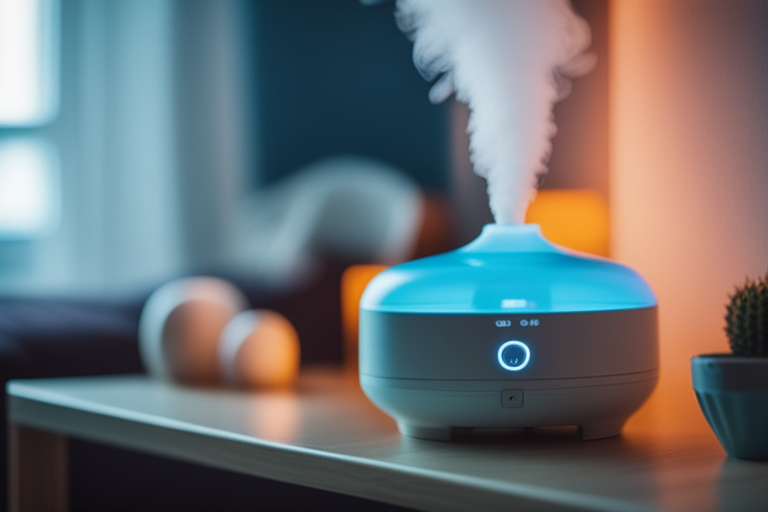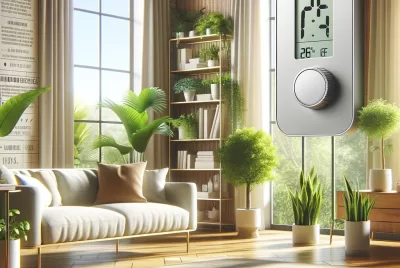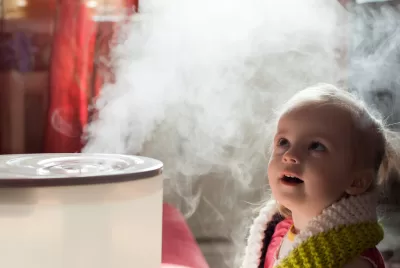Top 10 Advantages of a Humidifier for Your Home: Health, Air Quality and Energy Efficiency
"We may earn a commission for purchases made using our links. Please see our disclosure to learn more."
Are you wondering about the advantages humidifier in your home? As the weather gets colder, many people turn on their heating systems to keep their homes comfortable. However, heating systems can cause the air in your home to become dry, which can lead to a variety of health and respiratory problems. One way to combat this issue is by using a humidifier in your home. In this article, we will explore the top 10 advantages of a humidifier, including its impact on your health, air quality, and energy efficiency.
Advantages of a Humidifier
A humidifier is a device that adds moisture to the air in your home. There are several types of humidifiers available, including cool mist, warm mist, evaporative, and ultrasonic, each with its own pros and cons. Humidifiers bring a range of advantages for your health, the air quality in your home, and your energy efficiency. By using a humidifier, you can alleviate dry skin, allergies, sinusitis, and respiratory conditions, improve sleep quality, boost your overall health and well-being, reduce airborne viruses, bacteria, and allergens, protect your furniture and wood floors from damage, and reduce heating and cooling costs.
Top 10 Advantages of having a Humidifier in Your Home
- Humidifiers improve health by alleviating dry skin, allergies, sinusitis, and respiratory conditions, boosting overall health and well-being, and improving sleep quality and reducing snoring.
- They improve air quality by reducing airborne viruses, bacteria, and allergens and prevent damage to furniture and flooring.
- Using a humidifier can reduce heating and cooling costs while maximizing energy efficiency.

Health Benefits
One of the most significant advantages of using a humidifier is its impact on your health. Dry air can irritate your nose and throat, causing a variety of respiratory problems. By using a humidifier, you can alleviate these issues and improve your overall health and well-being.
Alleviating Dry Skin, Allergies, Sinusitis, and Respiratory Conditions
Dry air can cause your skin to become dry and itchy, leading to a range of skin problems. By using a humidifier, you can add moisture to the air, which can alleviate dry skin and promote healthy skin. Humidifiers can also help alleviate allergies, sinusitis, and respiratory conditions by keeping your nasal passages moist and reducing irritation.
Improving Sleep Quality and Reducing Snoring
Dry air can also impact your sleep quality, leading to snoring and other sleep-related problems. By using a humidifier, you can add moisture to the air, which can improve your sleep quality and reduce snoring.
Boosting Overall Health and Well-being
By improving the air quality in your home and reducing respiratory problems, using a humidifier can boost your overall health and well-being. You may find that you have more energy, feel more refreshed in the morning, and have a stronger immune system.

Improved Air Quality
Another significant gain of using a humidifier is its impact on the air quality in your home. Humidifiers can reduce airborne viruses, bacteria, and allergens by adding moisture to the air. Dry air can also impact the air quality in your home, leading to a range of health problems.
How Humidifiers Reduce Airborne Viruses, Bacteria, and Allergens
Humidifiers add moisture to the air, which can reduce the number of airborne viruses, bacteria, and allergens in your home. This can help reduce the risk of respiratory infections and other health problems.
The Impact of Dry Air on Air Quality
Dry air can cause a range of health problems, including respiratory issues, dry skin, and allergies. By using a humidifier, you can improve the air quality in your home and reduce these problems.
The Benefits of Using Different Types of Humidifiers to Improve Air Quality in Your Home
There are different types of humidifiers, each with its own pros and cons. Cool mist humidifiers are relatively inexpensive, but they can be noisy and require frequent cleaning. Warm mist humidifiers are quieter than cool mist humidifiers but require more maintenance and can be more expensive. Evaporative humidifiers are quiet and energy-efficient, but they can be more expensive than other types of humidifiers. Ultrasonic humidifiers are quiet and energy-efficient, but they can be more expensive than other types of humidifiers.

Energy Efficiency
In addition to its health and air quality benefits, using a humidifier can also improve your energy efficiency. Dry air can impact your temperature perception, causing you to feel colder than you actually are. By using a humidifier, you can improve your comfort level and reduce the amount of energy you need to heat your home.
The Impact of Dry Air on Temperature Perception
Dry air can make your home feel colder than it actually is, which can lead you to turn up your heating system and use more energy.
How Using a Humidifier Can Reduce Heating and Cooling Costs
By using a humidifier, you can improve your comfort level and reduce the amount of energy you need to heat your home. This can help you save money on your heating and cooling bills.
Tips for Maximizing Energy Efficiency When Using a Humidifier
To maximize your energy efficiency when using a humidifier, you should choose the right type of humidifier for your needs, use it only when necessary, and keep it clean and well-maintained.

Protecting Furniture and Wood Floors
Dry air can also impact your furniture and wood floors, causing them to crack and warp. By using a humidifier, you can add moisture to the air and protect your furnishings and flooring.
The Impact of Dry Air on Wood Floors and Furniture
Dry air can cause wood floors and furniture to crack, warp, and shrink. This can lead to expensive repairs and replacements.
How Using a Humidifier Can Prevent Damage to Furnishings and Flooring
By using a humidifier, you can add moisture to the air and reduce the risk of damage to your furnishings and flooring.
Tips for Using a Humidifier to Protect Your Home’s Interior
To protect your home’s interior, you should use a humidifier with a built-in humidistat, keep the humidity level between 30-50%, and monitor your home’s humidity levels regularly.
| Factors to Consider When Choosing a Humidifier | Description |
|---|---|
| Room size and coverage area | Choose a humidifier that is designed to cover the square footage of your room. |
| Type of humidifier | Choose a humidifier that meets your specific needs and preferences. |
| Features and functions | Choose a humidifier with features that meet your needs, such as automatic shut-off, humidistats, and timers. |
| Noise level | Choose a humidifier that is quiet enough for your needs. |
| Maintenance and cleaning requirements | Choose a humidifier that is easy to clean and maintain. |
| Budget considerations | Choose a humidifier that meets your needs and fits within your budget. |

Factors to Consider When Choosing a Humidifier
When choosing a humidifier, there are several factors you should consider, including room size and coverage area, type of humidifier, features and functions, noise level, maintenance and cleaning requirements, and budget considerations.
Room Size and Coverage Area
The size of the room you plan to use the humidifier in will impact the type and size of humidifier you need. You should choose a humidifier that is designed to cover the square footage of your room.
Type of Humidifier
The type of humidifier you choose will impact its cost, maintenance requirements, and performance. You should choose a humidifier that meets your specific needs and preferences.
Features and Functions
Humidifiers come with a range of features and functions, including automatic shut-off, humidistats, and timers. You should choose a humidifier with features that meet your needs.
Noise Level
Some humidifiers can be noisy, which can impact your comfort level and sleep quality. You should choose a humidifier that is quiet enough for your needs.
Maintenance and Cleaning Requirements
All humidifiers require regular maintenance and cleaning to ensure optimal performance. You should choose a humidifier that is easy to clean and maintain.
Budget Considerations
Humidifiers come in a range of price points, from budget-friendly options to high-end models. You should choose a humidifier that meets your needs and fits within your budget.
Maintenance and Cleaning
Regular maintenance and cleaning are essential for ensuring optimal performance and longevity of your humidifier.
Importance of Regular Maintenance and Cleaning
Regular maintenance and cleaning can prevent mold and bacteria growth, ensure optimal performance, and extend the life of your humidifier.
How to Clean a Humidifier Properly
To clean your humidifier properly, you should disassemble it, empty any remaining water, and use a mild cleaning solution and a soft brush to clean the tank and other components.
How Often to Replace Filters and Other Components
The frequency at which you need to replace filters and other components will vary depending on the type of humidifier you have and how often you use it. You should follow the manufacturer’s instructions for replacing filters and other components.
Case Study: How a Humidifier Helped Jane Manage Her Seasonal Allergies
Jane was always excited to welcome the summer season, but along with the warm weather came her seasonal allergies. She would constantly sneeze, have a runny nose, and feel congested. Her allergies would often disrupt her sleep, leaving her feeling tired and groggy the next day. She tried various remedies, but nothing seemed to work.
One day, Jane decided to try a humidifier in her bedroom. She had read that humidifiers could help alleviate allergy symptoms by adding moisture to the air and reducing airborne allergens. She purchased a cool mist humidifier and started using it every night.
To her surprise, she started noticing a significant improvement in her allergy symptoms. She was able to breathe better, and her nose wasn’t as stuffy anymore. She was able to sleep through the night without any interruptions, and she woke up feeling refreshed and energized.
Jane continued to use her humidifier throughout the summer months, and it made a huge difference in managing her seasonal allergies. She was able to enjoy the warm weather without the constant discomfort and irritation caused by her allergies.
If you suffer from seasonal allergies like Jane, using a humidifier may be worth considering. It can be an effective and natural way to alleviate allergy symptoms and improve your overall quality of life.
Conclusion
Using a humidifier in your home can offer a range of benefits for your health, air quality, and energy efficiency. When choosing a humidifier, consider factors like room size, type of humidifier, features and functions, noise level, maintenance and cleaning requirements, and budget considerations. With regular maintenance and cleaning, your humidifier can provide years of reliable performance and improved indoor air quality. So, if you want to improve your indoor air quality and enjoy the benefits of a humidifier, choose the right one for your needs and start using it today!




